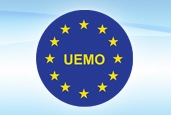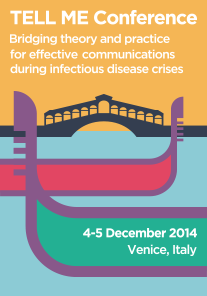Partners
School of Public Health at the University of Haifa (Israel)
![]() The School of Public Health was established in 2003, and is now the largest school of public health in Israel. There are 40 members of the teaching staff. They comprise university-based scientists, and public health professionals from different fields who combine their regular duties with research, training and teaching. Senior graduate students serve as teaching assistants. The mission of the school has several components. These include training of professionals in public health, health management and related sciences, identifying and researching important public health issues, developing new research tools in public health, evaluating inequalities in health and study means of reducing them, strengthening community health programs, promoting evidence-based public health information in the media and advancing the field of risk communication. The study program is structured so as to prepare students for a large variety of managerial and non-managerial positions in health systems, medical industry, research institutions, academic institutions, international organizations and non-governmental organizations. In the field of infectious disease epidemiology, subjects researched include evaluation of seasonal influenza associated mortality, evaluation of methods for surveillance for unusual infectious diseases, immunization policy, factors associated with vaccination coverage, implementation of new vaccination policies, effect of vaccines on population health, factors associated with opposition to vaccinations. There is active international collaboration with universities in the United States.
The School of Public Health was established in 2003, and is now the largest school of public health in Israel. There are 40 members of the teaching staff. They comprise university-based scientists, and public health professionals from different fields who combine their regular duties with research, training and teaching. Senior graduate students serve as teaching assistants. The mission of the school has several components. These include training of professionals in public health, health management and related sciences, identifying and researching important public health issues, developing new research tools in public health, evaluating inequalities in health and study means of reducing them, strengthening community health programs, promoting evidence-based public health information in the media and advancing the field of risk communication. The study program is structured so as to prepare students for a large variety of managerial and non-managerial positions in health systems, medical industry, research institutions, academic institutions, international organizations and non-governmental organizations. In the field of infectious disease epidemiology, subjects researched include evaluation of seasonal influenza associated mortality, evaluation of methods for surveillance for unusual infectious diseases, immunization policy, factors associated with vaccination coverage, implementation of new vaccination policies, effect of vaccines on population health, factors associated with opposition to vaccinations. There is active international collaboration with universities in the United States.
Website: http://hw.haifa.ac.il/index.php/facultydeps/publichealth
Staff: Manfred Green, Anat Gesser-Edelsberg, Charles T. Salmon
Centre for Research in social simulation - CRESS
 The Centre for Research in social simulation – University of Surrey is a multidisciplinary centre bringing together the social sciences, software engineering and agent-based computing to promote and support the use of social simulation. The University of Surrey is a research-focused University founded in 1967 with a mission that emphasizes professional and applied research. It has strong research groups in engineering (especially space science and communications), biomedical and health sciences, and the social sciences. It owns and manages a very successful science park adjacent to the campus and derives substantial income from industrial collaborations. In proportion to its size, it has the third greatest proportion of its income from research grants and contracts of all the British Universities. The Centre for Research in Social Simulation (CRESS) is involved in a number of research projects applying simulation to policy concerned with the governance of science, web-based social networks, and basic research on modelling the evolution of social structure.
The Centre for Research in social simulation – University of Surrey is a multidisciplinary centre bringing together the social sciences, software engineering and agent-based computing to promote and support the use of social simulation. The University of Surrey is a research-focused University founded in 1967 with a mission that emphasizes professional and applied research. It has strong research groups in engineering (especially space science and communications), biomedical and health sciences, and the social sciences. It owns and manages a very successful science park adjacent to the campus and derives substantial income from industrial collaborations. In proportion to its size, it has the third greatest proportion of its income from research grants and contracts of all the British Universities. The Centre for Research in Social Simulation (CRESS) is involved in a number of research projects applying simulation to policy concerned with the governance of science, web-based social networks, and basic research on modelling the evolution of social structure.
Website: http://cress.soc.surrey.ac.uk
CRESS staff: Nigel Gilbert
National Centre for Epidemiology, Surveillance and Health Promotion, CNESPS (Italy)
 It is one of the 14 departments and centers of Istituto Superiore di Sanità (ISS), and the leading technical and scientific public body of the Italian National Health Service. Its activities include research, control, training and consultation in the interest of public health protection. The Institute conducts scientific research in a wide variety of fields, from cutting-edge molecular and genetic research to population-based studies of risk factors for disease and disability up to Bioethical areas. Research priorities are based on those set forth in the National Health Plan.
It is one of the 14 departments and centers of Istituto Superiore di Sanità (ISS), and the leading technical and scientific public body of the Italian National Health Service. Its activities include research, control, training and consultation in the interest of public health protection. The Institute conducts scientific research in a wide variety of fields, from cutting-edge molecular and genetic research to population-based studies of risk factors for disease and disability up to Bioethical areas. Research priorities are based on those set forth in the National Health Plan.
Within the Centre the Communicable diseases unit is mainly devoted to monitor trends in disease, mortality and other health factors and provides technical support for health-related environmental surveys and for investigations of epidemics and other public health problems at national, regional and local level. Pandemic and seasonal influenza is a mayor activity in the center from more than 20 years : several projects national and European helps interpreting the influenza trends and to evaluate the impact of preventing measures.
Website: www.iss.it
CNESP staff: Barbara De Mei, Valentina Possenti, Chiara Cattaneo
Bmj Publishing Group Ltd
 BMJ Publishing Group Ltd (BMJG) is a wholly owned subsidiary of the British Medical Association (BMA). Established in 1840 with the publication of the first edition of the British Medical Journal, the BMJG was a transferred into a separate legal entity in 1 January 2003. The BMA is a voluntary association of doctors founded in 1832. In 1971, the Association was registered as an independent Trade Union. BMJ Group is an internationally renowned provider of medical information and services. BMJ Group is committed to supporting the highest standards of practice in health care through our extensive range of products, such as Bmjournal, Evidence-based medicine tools and services, and a social media for health professionals (Doc2Doc).
BMJ Publishing Group Ltd (BMJG) is a wholly owned subsidiary of the British Medical Association (BMA). Established in 1840 with the publication of the first edition of the British Medical Journal, the BMJG was a transferred into a separate legal entity in 1 January 2003. The BMA is a voluntary association of doctors founded in 1832. In 1971, the Association was registered as an independent Trade Union. BMJ Group is an internationally renowned provider of medical information and services. BMJ Group is committed to supporting the highest standards of practice in health care through our extensive range of products, such as Bmjournal, Evidence-based medicine tools and services, and a social media for health professionals (Doc2Doc).
Doc2doc was set up in 2009 as an international online community for health care professionals. It has nearly 40 000 registered users worldwide and hosts a variety of clinical and non clinical discussion groups. It is moderated by doctors. It uses Pluck software to host the community, which provides state of the art community functionality. Pluck is used by international organisations such as the Hearst Corporation and Sky and has high levels of service agreements with its purchasers. It provides a managed service which is supplemented by the BMJ Group’s in house technology team. It is continually developing new functionality and has regular new releases.
Website: www.bmj.com
BMJ staff: Matthew Billingsley, Luisa Dillner, Sabreena Malik
CEDARthree Ltd
 CEDARthree Ltd specialises in crisis management consultancy. The company believes in a straightforward and practical approach to crisis management. This is born out of extensive experience of conducting crisis management across many different sectors for over twenty years. CEDARthree Limited works closely with clients to develop bespoke crisis management plans and processes based on key principles. The 'three' in CEDARthree Limited stands for 'readiness, response and recovery'. This sums up the requirement - an organisation which is well prepared for a crisis is much more likely to have an effective response which in turn will speed its recovery. CEDARthree has trained, exercised and developed crisis management plans for many organisations both in UK, Europe and further afield. CEDARthree has recently assisted the European Academy in Berlin to present a seminar on European Critical Infrastructure Protection which was attended by 11 European countries.
CEDARthree Ltd specialises in crisis management consultancy. The company believes in a straightforward and practical approach to crisis management. This is born out of extensive experience of conducting crisis management across many different sectors for over twenty years. CEDARthree Limited works closely with clients to develop bespoke crisis management plans and processes based on key principles. The 'three' in CEDARthree Limited stands for 'readiness, response and recovery'. This sums up the requirement - an organisation which is well prepared for a crisis is much more likely to have an effective response which in turn will speed its recovery. CEDARthree has trained, exercised and developed crisis management plans for many organisations both in UK, Europe and further afield. CEDARthree has recently assisted the European Academy in Berlin to present a seminar on European Critical Infrastructure Protection which was attended by 11 European countries.
Website: www.cedarthree.co.uk
CEDARthree staff: Simon Langdon
European Union of General Practitioners, UEMO
 The European Union of General Practitioners/ Family physicians (UEMO) is association of the most representative national, non-governmental, independent organisations representing general practitioners/family physicians in the countries of the European Union and the European Economic Area. UEMO as international organisation’s main objectives are, as follows: to study and promote the highest standard of patient care, special training, continuing medical education and continuing professional development, professional practice conditions within the field of the general practice / family medicine throughout Europe, as well as to defend the role of general practitioners/ family physicians in the healthcare systems. Furthermore, UEMO promotes the ethical, scientific, professional, social and economic interests of the European community of the general practitioners / family physicians and is committed to secure their freedom of practice in the interests of the patients.
The European Union of General Practitioners/ Family physicians (UEMO) is association of the most representative national, non-governmental, independent organisations representing general practitioners/family physicians in the countries of the European Union and the European Economic Area. UEMO as international organisation’s main objectives are, as follows: to study and promote the highest standard of patient care, special training, continuing medical education and continuing professional development, professional practice conditions within the field of the general practice / family medicine throughout Europe, as well as to defend the role of general practitioners/ family physicians in the healthcare systems. Furthermore, UEMO promotes the ethical, scientific, professional, social and economic interests of the European community of the general practitioners / family physicians and is committed to secure their freedom of practice in the interests of the patients.
Website: www.uemo.org
UEMO staff: Ferenc Hajnal
Latvian Centre for Human Rights
 The Latvian Centre for Human Rights (LCHR) was established in 1993 with a view to promoting human rights and tolerance in Latvia through monitoring, research, advocacy, legal assistance and training activities. In recent years, LCHR main focus has been on two broad areas: human rights in closed institutions, and social integration, which includes all minority-related and tolerance issues, as they represent the most important problem areas of human rights in Latvia. The LCHR collects and analyses diverse materials and phenomena related to its main area of expertise, and is regularly involves n collecting data and closely following legislative, policy and real case development in the human rights area and the social integration area. In addition, monitoring visits to closed institutions are being conducted, and our staff lawyer provides free-of- charge legal assistance to individuals with human rights cases.
The Latvian Centre for Human Rights (LCHR) was established in 1993 with a view to promoting human rights and tolerance in Latvia through monitoring, research, advocacy, legal assistance and training activities. In recent years, LCHR main focus has been on two broad areas: human rights in closed institutions, and social integration, which includes all minority-related and tolerance issues, as they represent the most important problem areas of human rights in Latvia. The LCHR collects and analyses diverse materials and phenomena related to its main area of expertise, and is regularly involves n collecting data and closely following legislative, policy and real case development in the human rights area and the social integration area. In addition, monitoring visits to closed institutions are being conducted, and our staff lawyer provides free-of- charge legal assistance to individuals with human rights cases.
Website: www.humanrights.org.lv
LCHR Staff: Ilze Brands Kehris, Anhelita Kamenska
Vrije Universiteit Brussels, VUB
 The interdisciplinary Research Group on Law Science Technology & Society at the Vrije Universiteit Brussel (LSTS) is devoted to analytical, theoretical and prospective research into the relationships between law, science, technology and society. Even if LSTS’s core expertise is legal, it also has a strong experience and track record in legal theory, philosophy of sciences and bio-ethics, and engages in criminological and STS-research too. LSTS is has a well-established reputation in research concerning privacy and data protection, profiling technologies, ambient intelligence and ‘autonomic computing’ in a broader sense. Next to this LSTS research deals with the regulation of technology; with the impact of security and crime-fighting policies upon human rights; with issues at the crossroads of intellectual property law and science and technology; with the impact of profiling techniques and statistics on the law and the individual; with the participation of the citizens, civil society and publics, into science and technology policies (participatory Technology Assessment, rethinking representation) and with the legal and ethical issues relating to the commodification of human body material (focussing especially on organ transfer, biobanking and patenting of human body material). The team has been involved in internationally networked research projects and publishes widely.
The interdisciplinary Research Group on Law Science Technology & Society at the Vrije Universiteit Brussel (LSTS) is devoted to analytical, theoretical and prospective research into the relationships between law, science, technology and society. Even if LSTS’s core expertise is legal, it also has a strong experience and track record in legal theory, philosophy of sciences and bio-ethics, and engages in criminological and STS-research too. LSTS is has a well-established reputation in research concerning privacy and data protection, profiling technologies, ambient intelligence and ‘autonomic computing’ in a broader sense. Next to this LSTS research deals with the regulation of technology; with the impact of security and crime-fighting policies upon human rights; with issues at the crossroads of intellectual property law and science and technology; with the impact of profiling techniques and statistics on the law and the individual; with the participation of the citizens, civil society and publics, into science and technology policies (participatory Technology Assessment, rethinking representation) and with the legal and ethical issues relating to the commodification of human body material (focussing especially on organ transfer, biobanking and patenting of human body material). The team has been involved in internationally networked research projects and publishes widely.
Website: www.vub.ac.be/infovoor/onderzoekers/research/team.php?team_code=LSTS
VUB staff: Serge Gutwirth, Paul De Hert
National Disaster Life Support Foundation, NDLSF (US)
 In 2003 four major academic centers, (Medical College of Georgia, University of Texas Houston, University of Texas Southwestern, and The University of Georgia) in partnership with the American Medical Association (AMA), established the National Disaster Life SupportTM (NDLSTM) training program to better prepare health care professionals and emergency response personnel for mass casualty events. The overarching goal is to standardize emergency response training nationwide and strengthen our nation’s public health system.
In 2003 four major academic centers, (Medical College of Georgia, University of Texas Houston, University of Texas Southwestern, and The University of Georgia) in partnership with the American Medical Association (AMA), established the National Disaster Life SupportTM (NDLSTM) training program to better prepare health care professionals and emergency response personnel for mass casualty events. The overarching goal is to standardize emergency response training nationwide and strengthen our nation’s public health system.
In order to oversee the rapidly-growing program, the principals established a non-profit foundation, the National Disaster Life Support FoundationTM (NDLSFTM), in 2004. The NDLSFTM is responsible for the establishment and accreditation of a national network of training centers. The AMA is the sponsoring and continuing medical education (CME) accrediting organization for this initiative as well as the publisher of the texts. The NDLSTM courses stress a comprehensive, all-hazards approach to help physicians and other health professionals deal with catastrophic emergencies from terrorist acts as well as from explosions, fires, natural disasters (such as hurricanes and floods), and infectious diseases.
Website: www.ndlsf.org
NDLSF staff: James J. James, Italo Subbarao,Jack Horner
Vitamib (France)
 Vitamib is an SME created in 1999 by academics, researchers and engineers from a Joint Research Unit of the French CNRS and the Joseph Fourier University, Grenoble, France. VITAMIB is employing 12 engineers and consultants. From the very beginning, and owing to its consultants, VITAMIB took advantage of a 20-year management experience of European funding in very different programs and R&D projects, accompanying measures, concerted actions, training courses as well as sustained development initiatives.
Vitamib is an SME created in 1999 by academics, researchers and engineers from a Joint Research Unit of the French CNRS and the Joseph Fourier University, Grenoble, France. VITAMIB is employing 12 engineers and consultants. From the very beginning, and owing to its consultants, VITAMIB took advantage of a 20-year management experience of European funding in very different programs and R&D projects, accompanying measures, concerted actions, training courses as well as sustained development initiatives.
Vitamib is responsible for:
- Chairing the Project Management Board;
- Fostering the use of the project communication and project management tools by all participants in order to sustain operational consistency;
- Ensuring smooth operation of the project and guarantee that all efforts are focused towards the objectives;
- Submitting all required progress reports, deliverables and financial statements to the EC;
- Transferring the advance payments and further payments to the participants.
The Scientific and Technical coordinator (CSSC) is the supervisor of the progress of the project and shall thus be responsible for the scientific and technical coordination across the Work Packages.
Website: www.vitamib.com
Vitamib staff: Olivier de Bardonneche, Gérard Brugal
Zadig ltd (Italy)
 Zadig srl is a leading media SME that focuses on health communication, technology, and science. Since its constitution in 1993, Zadig operates mainly in the field of medicine and public health. Its aim is to give critical and correct information, not only about technical issues, but also about their implications on ethics, policy making and society. To achieve this goals, Zadig operates in four main areas: Communication, Publishing, Research, Learning. Zadig is a partner of the Italian Cochrane Centre, from its foundation in 1994, for publishing and e-learning activities. Since 1998 Zadig is a partner of the National Guidelines Program, of the Italian National Institute of Health (ISS), as operative unit for the communication and publishing activities. On behalf of the Ministry of Health and of the Italian Drug Agency, from 2005 to 2008 Zadig has pioneered an experimental program of e-learning for medical doctor and nurses, with evidence based contents and the implementation of medical vignettes as an adult learning (andragogic) tool.
Zadig srl is a leading media SME that focuses on health communication, technology, and science. Since its constitution in 1993, Zadig operates mainly in the field of medicine and public health. Its aim is to give critical and correct information, not only about technical issues, but also about their implications on ethics, policy making and society. To achieve this goals, Zadig operates in four main areas: Communication, Publishing, Research, Learning. Zadig is a partner of the Italian Cochrane Centre, from its foundation in 1994, for publishing and e-learning activities. Since 1998 Zadig is a partner of the National Guidelines Program, of the Italian National Institute of Health (ISS), as operative unit for the communication and publishing activities. On behalf of the Ministry of Health and of the Italian Drug Agency, from 2005 to 2008 Zadig has pioneered an experimental program of e-learning for medical doctor and nurses, with evidence based contents and the implementation of medical vignettes as an adult learning (andragogic) tool.
Website: www.zadig.it
Zadig staff: Roberto Satolli, Luca Carra, Roberta Villa, Pietro Dri, Giulia Candiani, Sergio Cima, Michele Bellone, Emanuela Clavarino
Centre for Science, Society and Citizenship, CSSC (Italy)
 As of March 2014, CSSC had to withdraw as partner from the TELL ME consortium and consequently from its role as a scientific coordinator of the project.
As of March 2014, CSSC had to withdraw as partner from the TELL ME consortium and consequently from its role as a scientific coordinator of the project.
Website: www.cssc.eu


